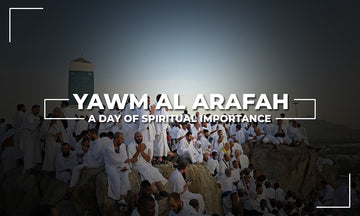Arafah – The Day of Arafah is also called the Day of the Standing (Yawm Al-Waqf). Yawm Al Arafah, a day with profound spiritual significance in the Islamic calendar, holds a special place in the hearts of Muslims worldwide. It is the day pilgrims gather at the mountain plain of Arafah during Hajj pilgrimage, praying and supplicating to their Lord.
On this day, pilgrims gather in the mountain plains of Arafah to pray and invoke Allah (SWT). An ayat is also revealed here,
'This day I have perfected for you your religion and completed My favor upon you and have approved for you Islam as religion.' (Surah al Maa'idah 5:3).
Arafah is the ninth day of Dhul-Ḥijjah. The Day of Arafa is also significant in many ways. According to an authentic hadith report, the Messenger of Allah (SAW) said: 'Hajj is Arafat' (Sunan an-Nasa’i 3016). Other rituals cannot compensate for the absence of this ritual, so there is little that can be done if it is missed. One cannot complete Hajj without observing the Day of Arafa.
Why is the Day of Arafah so important?
Yawm al-Arafah is not only an important day for pilgrims performing Hajj but also for Muslims around the world. Prophet Muhammad (peace be upon him) is reported to have said,'There is no day on which Allah saves more people from the fires than on the day of Arafah.' This statement is said to be the greatest mercy and forgiveness to His servants on this auspicious day.
Muslims who are not on pilgrimage are encouraged to take the opportunity provided by Yum al-Arafah to participate in acts of worship, seek forgiveness, and strengthen their relationship with Allah. That day is a reminder of the importance of repentance, humility, and the pursuit of spiritual growth.
Rituals of Yawm al-Arafah:
Standing in Worship:
On Yom al-Arafah, pilgrims stay on the Plain of Arafat from noon to sunset, engaging in worship, meditation, and prayer. The ritual called wuquf is a symbol of Muslim unity and submission to Allah. The posture is a physical manifestation of humility and devotion, emphasizing the equality of all people before Allah.Supplication and Repentance:
Whether or not Muslims perform the Hajj, they are encouraged to perform increased acts of worship on Yawm al-Arafah. They teach them to spend the day in prayer, begging, and asking for forgiveness. It is believed that Allah especially accepts prayers on this day and that sincere repentance can result in the forgiveness of past mistakes.Fasting:
It is highly recommended that those who are not performing Hajj, they could fast on Yawm al-Arafah. Prophet Muhammad (peace be upon him) emphasized the virtues of fasting on this day, saying that it expiates the sins of the previous year and the coming year. Fasting is a form of self-discipline, spiritual reflection, and compassion for the less fortunate.Give Sadaqah:
On this holy day, it is important to remember our brothers and sisters in need around the world. Performing Sadaqa is one of the kindest acts of worship, and performing Sadaqa on this holy day helps us receive blessings.Prophet Muhammad (peace be upon him) said:
'Sadaqah extinguishes sin as water extinguishes fire.' (Hadith | Timidhi).
Dua for Day of Arafah
Muslims are encouraged to recite the following Dua on the day of Arafah:Dua: لَا إِلَهَ إِلَّا اللهُ ، وَحْدَهُ لَا شَرِيكَ لَهُ ، لَهُ الْمُلْكُ وَلَهُ الْحَمْدُ ، وهُوَ عَلَى كُلِّ شَيْءٍ قَدِيرٌ
Translation: 'None has the right to be worshipped except Allah, alone, without partner. To Him belongs sovereignty and all praise, and He is over all things omnipotent.'
The Prophet Muhammad (peace be upon him) said:
The best supplication is the supplication on the Day of Arafah, and the best words that I and the prophets before me have said are 'La ilaha illa Allah, wahdahu la sharika lahla hul mulk wa lahul hamd wa huwa ala kulli shayin qadeer'
Hadith | Tirmidhi
In Islam, Yawm al-Arafah is a day of deep spiritual significance, closely associated with the annual Hajj pilgrimage. It serves as a reminder of the importance of submission to Allah, seeking forgiveness and worship. The lessons learned, and spiritual growth achieved on Yawm al-Arafah resonate throughout the Muslim community, creating a sense of unity, humility, and devotion.

